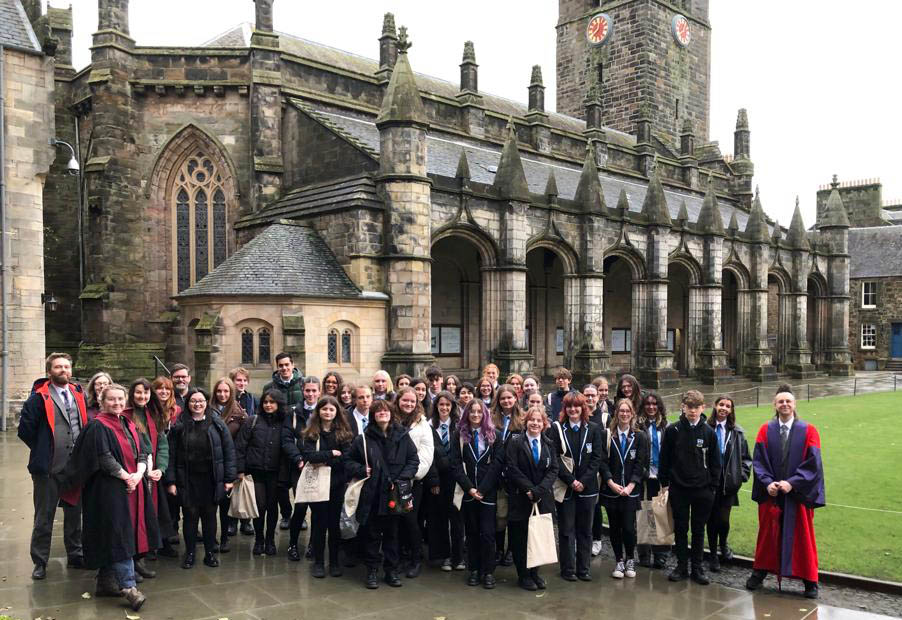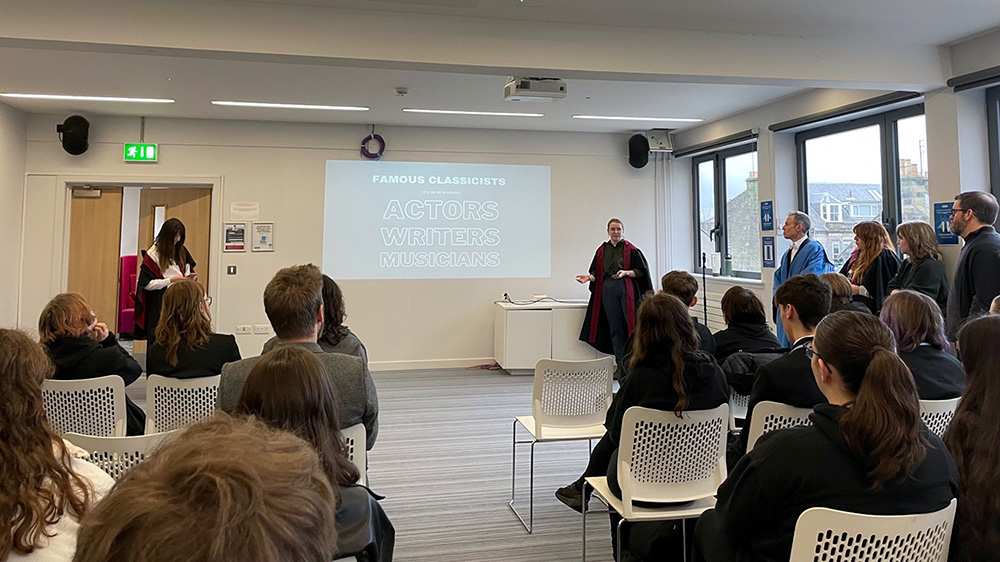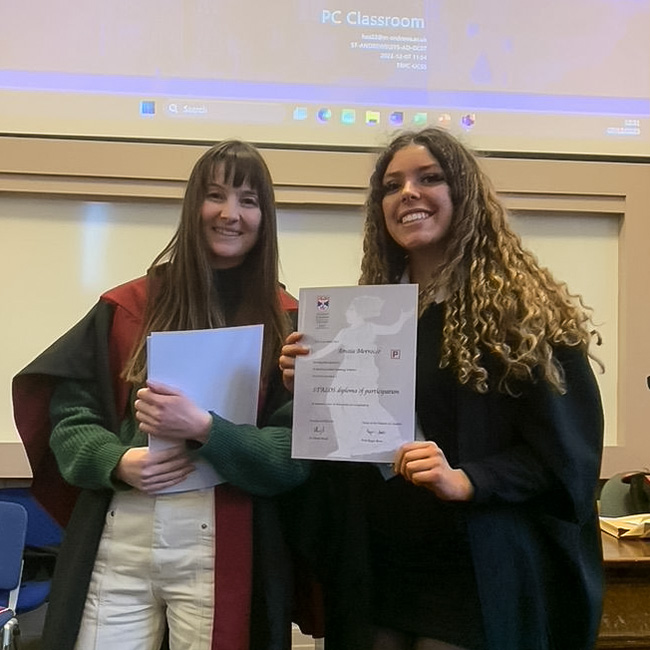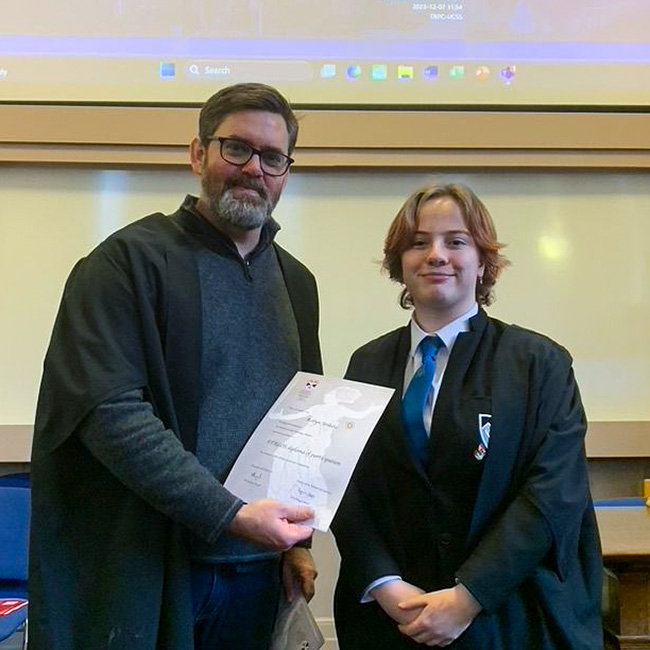STALOS Graduation Ceremony

On Thursday 7 December staff and students of University of St Andrews School of Classics welcomed two classes of lunchtime Latin learners to the university. We had a full day of activities beginning with a student-led opening session on life and university and the importance of Classical Studies and the Latin language. The group of 40 pupils from Tayside state schools, 20 from Monifieth High School and 20 from Grove Academy, Dundee, were welcomed officially by Professor Roger Rees, our Head of School. All staff and grad students were dressed in their academic gowns. As Roger explained, it is fairly rare that we dress in this way. We do so in times of celebration, and on this particular day we were celebrating the achievement of the pupils who had chosen to study Latin with us, and who had made such impressive progress.

Roger also spoke about how during their Latin lessons the pupils had been learning to work their intellectual muscles, and encouraged them to keep working away on them for their whole lives. If they liked STALOS, they would love university. Then Kate O’Neil, a third-year undergraguate student spoke about her experience of coming to the languages, history and literature of the ancient world at university.
After Kate it was the turn of the STALOS tutors: Postgraduate Researchers Amy Hopkins and Florence Rogers, who have been teaching the lunchtime class at the schools over the past month or two, taking over the excellent groundworks set by Eric Foster-Whiddon and Annabel Crawshaw-Brown. Amy and Florence spoke about why its important for us to experience classical culture in the world today. Is Latin really dead? They paraded a vivid catalogue of celebrity classicists to show just how varied a life you can have after a degree in Classics. Amy also made a forceful argument about the utility, or necessity of Humanities in a world apparently obsessed with STEM (Science, Technology, Engineering and Mathematics).


All this was hosted in the Students’ Union, a modern building in the centre of St Andrews. We walked from there, dodging the inclement weather, to the historic site of St Salvator’s Quad. It was in one of the oldest lecture halls that our Graduation Ceremony began. The STALOS students were awarded certificates of participation, and some university goodies, following their final test, which they all passed, several with Merits and Distinctions. After the ceremony, we had lunch together in Swallowgate, the School of Classics and then postgraduate student Kiara De Vore took the group over to the Wardlaw Museum, where they had a mini-tour of the collections and exhibitions currently on display.
It was a wonderful day, and the perfect way to celebrate the pupil’s success. Below is a version of the speech given by Mr George Connor, of Monifieth High School ahead of graduation.
We are extremely grateful to the Classical Association and the EDI Committee of the CUCD for their generous funding of this year’s STALOS programme. We are always in need of financial support, so if you feel an affinity with this project of extending Latin provision in the Scottish state sector, please do get in touch with Henry Stead ([email protected]).
Monifieth High School and STALOS
Again we meet on the anniversary of Cicero’s death. While we commemorate our fabulous pupils, we can also celebrate the beheading of that egotistical blowhard.
When Henry and I sat in a pub in Dundee two and a half years ago, we had an idea for an outreach programme to help inject some steroids into Latin in Tayside.
As you may know, in Tayside – that’s three full local authorities, twenty six schools – last year not one pupil sat Higher Latin in a state school.
Last session only 340 pupils across the whole of Scotland sat National 5 Latin. Just 70 came from state schools. 215 sat Higher Latin, with only 50 from state schools.
It is not an exaggeration or rhetoric to say that Latin in Scottish private schools maintains reasonable health, while it is languishing in our state schools.
And that is why STALOS, and by extension you pupils, is so important. STALOS shows two things:
- There is an appetite in state schools for Latin.
- There is a way to show it to schools who are thinking about running Latin courses.
And while I am more than capable of standing here and berating the short-sightedness of our educational authorities, I am delighted to instead be talking about some successes.
On the back of last year’s STALOS at Monifieth, I was able to strong-arm our senior staff to give me a National 5 Latin class. Just for S6s. Not on the timetable officially. And only two periods a week. But we have a foothold with an SQA course. Latin is again in the mix for session 2024-2025 at MHS. From a dozen or so pupils this year, I hope for more the following year, and more after that. Maybe, hopefully, Higher will come online eventually. These are tangible results for STALOS.
We also have another intake of STALOS pupils who have had the experience of learning an ancient language, broadening their academic horizons and enjoying Latin for its own sake. We must remember that while there are lots of reasons why pupils – and adults – might study Latin, the fundamental reason has to be simply that it is interesting. It’s the reason I studied it. It’s the reason most of the adults in this room studied it. An interest that blossomed into a love, and from there into academic success and careers. I am so proud that STALOS offers that beyond all other considerations.
And this year we have Grove Academy running the project too, bringing the opportunity to another group of teenagers in Dundee. I hope they have enjoyed it as much as we have, and will run it again next session.
These successes shine a light on Latin which is often missing, and it underscores a maxim that I have used over and over for the last year: children become what they see. It’s why children of teachers often become teachers themselves. It’s why children of doctors choose that professional route. But the reverse is also true: children are very unlikely to pursue a subject which they have never seen. STALOS not only shows Latin to our state sector, but commits to ten weeks of shining that light.
Pupils will talk to each other about STALOS. Teachers and school leaders will talk about STALOS. And suddenly Latin is alive in discussions within schools.
Colleagues at St Andrews, do not underestimate the power of this scheme. Without it, Latin becomes invisible and easy to dismiss. Its presence in schools is genuinely inspiring, and as I can testify, can lead to changing the qualifications landscape in Tayside. The work is remarkable.
I have to thank the tutors who put themselves forward to guide these sessions. Without you, there is no STALOS. You have delivered cheerful, enjoyable lessons with just the right amount of academic push. I think I speak for all of the pupils and staff when I say thank you for your generosity of time, energy and goodwill.
I also have to thank the School of Classics, and Henry Stead in particular for hatching this splendid scheme. I can’t think of two more productive beers I have had in my life.
I’d like to finish with a quick word about the pupils who choose Latin. I think all of this will apply to those from both schools.
Well done on choosing to have a go at something slightly outside your comfort zone. Well done for having a sense of academic adventure. Well done for giving up your lunchtimes to do something that matters for you, for your schools, for our universities, and for Latin as a subject in Scotland. Well done for seeing it through. Well done for showing your schools that Latin is not yet ready to give up the ghost. Well done, well done, well done. You are remarkable individuals.
It would be a cliché to finish with a Latin phrase. But I dashed this out at half eight this morning, so cliché is what you’re going to get.
Any number of Latin mottoes have the phrase “ad astra” – to the stars. I couldn’t pick just one, but I think that final clause is what matters.
I wish you every success and happiness in what you go on to do next, and may your lives reach ever upwards – to the stars – ad astra.
Thank you
George Connor
7 December 2023
University of St Andrews
